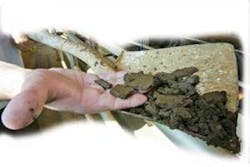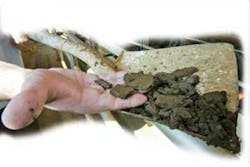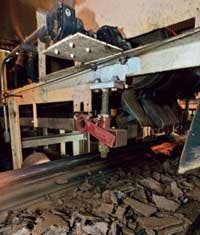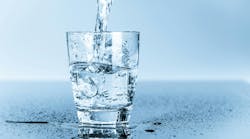by Randy Pankiewicz
As the country looks for "green" alternatives to combat climate change and rising gas prices, Pennsylvania American Water and its partners are identifying ways that drinking water residuals may assist in the production of an alternative fuel and aid in sediment control efforts to protect area watersheds.
Approximately 40 million gallons of water are pulled from the Monongahela River each day at Pennsylvania American Water's Hays Mine treatment plant in Carrick, resulting in about 8,000 tons of residual material each year. The water company has been beneficially using residual material from various treatment locations since the early 1980s.
When water is pumped from the Monongahela River for treatment and delivery, river silt and sediment is filtered out and pressed. The material has been successfully used in support of mine reclamation, agricultural applications and community gardening projects.
Recently Pennsylvania American Water began working on a project to support the production of ethanol or biodiesel. The water company has contracted with GTECH Strategies to provide residual material from its Pittsburgh-based water treatment facility for the local nonprofit community development organization to grow biofuel crops.
GTECH will receive approximately 4,000–6,000 tons of residual material this year. The group mixes the material with organic compost to build soil in order to grow switchgrass, sunflowers and canola that are used to produce ethanol or biodiesel.
Chris Koch, chief operating officer of GTECH, said he believes the mixture provides a very clean, strong topsoil and hopes to test how it works with other crops, such as oats and clover.
Pennsylvania American Water is also working on a pilot project for applying residual material to farmland in central Pennsylvania to help keep phosphorous from entering area streams. Along with silt and sediment, the drinking water residuals also contain aluminum and iron compounds. When applied to cropped fields, the residual materials have been shown to reduce the amount of soluble phosphorus by binding the phosphorous into non-soluble forms.
Approximately 97 percent of Pennsylvania American Water's residual material is used beneficially as a soil amendment by farmers, contractors and conservancies for growth and restoration.
Pennsylvania American Water is the largest investor-owned water utility in the state, providing high-quality and reliable water and/or wastewater services to more than 2.1 million people. In addition to its subsidiaries' regulated operations, American Water provides operation and maintenance services to an additional 112,000 people in Pennsylvania.
About the Author:
Randy Pankiewicz is the Environmental Compliance Manager with Pennsylvania American Water located in McMurray, Pa. He has been with American Water for 27 years and has held various positions in water quality, operations and management. Pankiewicz has a bachelor's degree in chemistry from the California University of Pennsylvania and is a Class A Water treatment plant operator in Pennsylvania. He is a member of American Water Works Association, Water Environment Federation and the Pennsylvania Water Environment Association.





